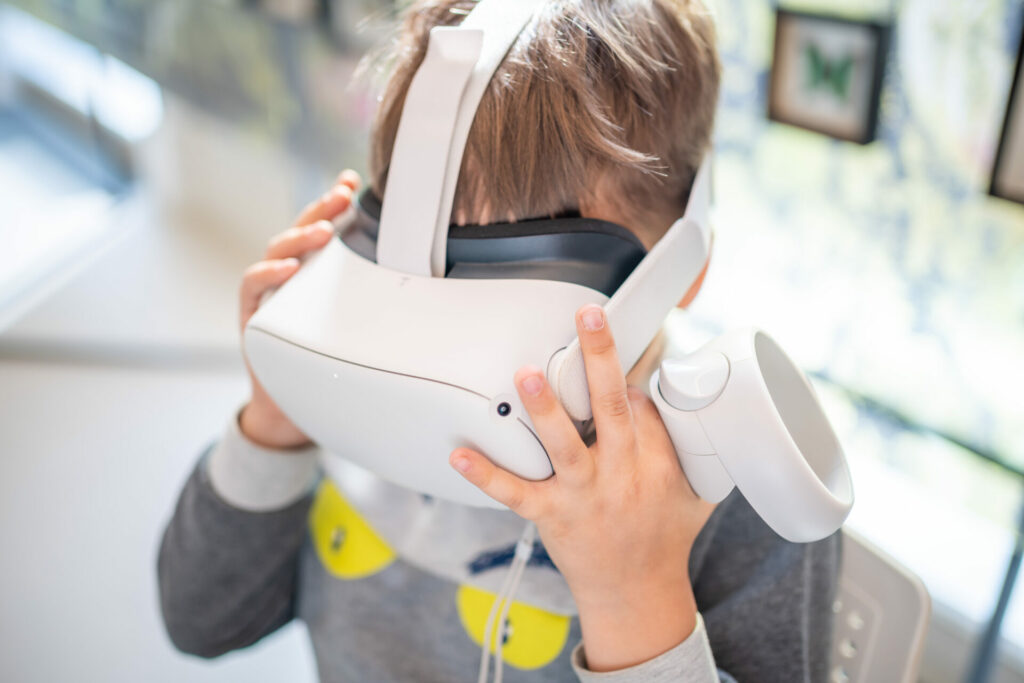Maximizing Student Learning: The Transformative Potential of VR in Education
Share this post ▸
March 6, 2024 | Cassie Hauschildt

Takeaways
- PricewaterhouseCoopers LLP’s (PwC) study highlights the benefits of integrating VR technology into classroom learning for soft skills training.
- VR simulations enhance understanding by providing immersive experiences that help visualize complex concepts in three-dimensional space.
- VR fosters improved connection among students and with learning material, peers, and educators, promoting collaboration and engagement.
- VR accelerates learning speed up to four times faster than traditional methods, providing personalized, hands-on experiences that enhance focus and attention, ultimately maximizing student engagement and learning outcomes.
PricewaterhouseCoopers LLP’s (PwC) groundbreaking study on Virtual Reality (VR) for soft skills training provides compelling evidence supporting the integration of VR technology into classroom learning. By exploring the transformative potential of VR in nurturing essential interpersonal competencies, the study presents a compelling case for educators to embrace VR as a tool for enriching student learning experiences while enhancing understanding, connections, and learning speed.
- Enhanced Understanding: VR simulations offer immersive experiences that can significantly enhance students’ understanding of complex concepts. By visualizing abstract ideas in a three-dimensional space, students gain a deeper comprehension of subject matter that may be challenging to grasp through traditional methods. In the PwC study, 40% of the v-learners saw an improvement in confidence compared to classroom learners and 35% improvement over e-learners to act on what they learned after training in VR.
- Improved Connection: VR fosters a sense of connection between students and the learning material, as well as with their peers and educators. Through collaborative VR experiences, students can work together to solve problems, explore virtual environments, and engage in shared learning activities. The PwC Study found that learners in VR felt 3.75 times more emotionally connected to the content than classroom learners and 2.3 times more connected than e-learners.
- Accelerated Learning Speed: The immersive and interactive nature of VR can significantly accelerate the learning process. The PwC study found that students learn up to four times faster when using VR compared to traditional classroom methods. By providing hands-on, experiential learning experiences, VR enables students to engage with content in a more active and dynamic way, leading to faster acquisition of knowledge and skills. Additionally, the personalized nature of VR allows students to learn at their own pace, further enhancing learning speed and efficiency.
- Enhanced Focus: VR experiences have been shown to increase student focus and attention during learning activities. The immersive nature of VR environments minimizes distractions and encourages students to remain engaged with the material. In the PwC study, learners in VR were Enhanced Focus: VR experiences have been shown to increase student focus and attention during learning activities. The immersive nature of VR environments minimizes distractions and encourages students to remain engaged with the material. This heightened level of focus not only improves learning outcomes but also fosters a more productive and conducive learning environment for students to thrive in.
Although PwC’s study specifically studies the effectiveness on VR in soft skills training, the findings can easily be applied the transformative potential of VR in education, particularly in enhancing students’ understanding, connections, and learning speed. By leveraging VR technology to create immersive, interactive, and personalized learning experiences, educators can maximize student engagement, promote collaborative learning, and accelerate the acquisition of essential skills.
VictoryXR is dedicated to providing a one-stop shop for teachers seeking to add VR to their classrooms. Our VXRLabs app contains immersive simulations for multiple courses, including but not limited to science, math, history, literature, forensics, CTE, and more. All content is created for teachers, by teachers. With VXRLabs, a school set of VR headsets can be shared among all teachers and subjects.
About VictoryXR: VictoryXR is a world-leader in providing immersive educational content and experiences to secondary and higher education students. Our goal is to introduce innovative ways for students to learn through virtual and augmented reality. Since VictoryXR’s founding in 2016, online education has rapidly grown in the United States and across the globe. Unfortunately, the traditional classroom has not adapted to online education. In its current form, online students find learning difficult, passive, and unenjoyable via video conferencing.
That is where VictoryXR comes in. We provide students of all ages with three primary immersive learning tools: 1) digital twin campus for synchronous teaching and learning, 2) advanced STEM labs that make hands-on learning accessible to everyone – even remote students, and 3) AI instructors, tutors and teaching assistants embodied as spatial 3D avatars.

Cassie Hauschildt is the Head of Communications for VictoryXR, the global leader in immersive, spatial education. She studied music, getting her bachelor’s degree from Idaho State University and working on her master’s at Texas Tech University, before pivoting to marketing. She is excited to help teachers discover the power of VR in education.








